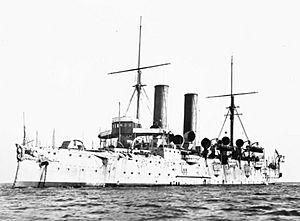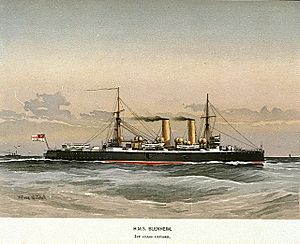HMS Blenheim (1890) facts for kids

HMS Blenheim
|
|
Quick facts for kids History |
|
|---|---|
| Name | HMS Blenheim |
| Builder | Thames Ironworks & Shipbuilding Company, Leamouth, London |
| Laid down | October 1888 |
| Launched | 5 July 1890 |
| Commissioned | 1891 |
| Decommissioned | 1926 |
| Reclassified | Depot ship 1907 |
| Fate | Sold for breaking up 13 July 1926 |
| General characteristics | |
| Class and type | Blake-class protected cruiser |
| Displacement | 9,150 tons |
| Length | 375 ft (114 m) |
| Beam | 65 ft (20 m) |
| Propulsion |
|
| Speed | 22 knots (41 km/h) |
| Armament |
|
HMS Blenheim was a large and powerful warship called a protected cruiser. She was part of the Royal Navy, which is the United Kingdom's navy, and served from 1890 to 1926. This impressive ship was built in London by the Thames Ironworks & Shipbuilding Company. She got her name from the famous Battle of Blenheim.
Contents
Ship Design and Features
HMS Blenheim was a protected cruiser, meaning she had an armoured deck to protect her engines and other vital parts. She was a very large ship for her time.
Size and Speed
The ship weighed 9,150 tons, which is like weighing 9,150 small cars! Her steel body was about 114 meters (375 feet) long and 20 meters (65 feet) wide. She had two propellers powered by large steam engines. These engines gave her a top speed of 22 knots, which is about 41 kilometers per hour (25 miles per hour).
Weapons and Armament
Blenheim carried a lot of firepower. Her main weapons were two huge 9.2-inch (234 mm) guns. She also had ten 6-inch (152 mm) guns. Six of these were on the upper deck, and four were protected inside armoured sections on the main deck. For closer combat, she had sixteen smaller 3-pounder (57 mm) guns. The ship also had four 14-inch torpedo tubes, which could launch torpedoes to hit enemy ships underwater.
Service History
HMS Blenheim had a long and interesting career with the Royal Navy. She traveled to many parts of the world and played different roles.
Early Years and Important Journeys
Blenheim was launched on July 5, 1890, and officially joined the navy on January 1, 1891. One of her first important tasks was in December 1894. She carried the body of Sir John Sparrow David Thompson, who was the Prime Minister of Canada, back home to Halifax, Nova Scotia. He had passed away in England. For this special journey, the ship was painted black.
In January 1896, Blenheim had another important mission. She brought the body of Prince Henry of Battenberg from the Canary Islands. Prince Henry had died from malaria while serving on another ship near Sierra Leone.
Accident with France I
On January 27, 1897, Blenheim was involved in an accident. She accidentally hit and badly damaged a very long French sailing ship called France I. This happened near Dungeness point. The crew on France I tried to warn Blenheim by shouting and sounding alarms. Blenheim changed course at the last moment, which prevented an even worse collision. Even though France I was badly damaged, she did not sink and was repaired.
Service in China
On January 2, 1901, Blenheim was recommissioned with a crew of 593 sailors. She was sent to the China station. Her job there was to support Britain's position during the Boxer Rebellion, a conflict in China. In June 1902, she visited the city of Nagasaki in Japan.
Later Roles and World War I
After her time in China, Blenheim served as a cruiser with the Channel Squadron. In May 1908, she joined the Mediterranean Fleet. Here, she changed her role and became a destroyer depot ship. This meant she acted as a floating base for smaller destroyer ships, providing supplies and repairs.
During World War I, in March 1915, Blenheim was sent to Mudros. She supported the British forces during the Battle of Gallipoli. Later that year, she again carried the body of a former Canadian Prime Minister, Sir Charles Tupper, back to Halifax after he died in England.
End of Service
After many years of service, HMS Blenheim was finally taken out of service. She was sold for scrap in 1926 at Pembroke Dock.
 | Anna J. Cooper |
 | Mary McLeod Bethune |
 | Lillie Mae Bradford |


